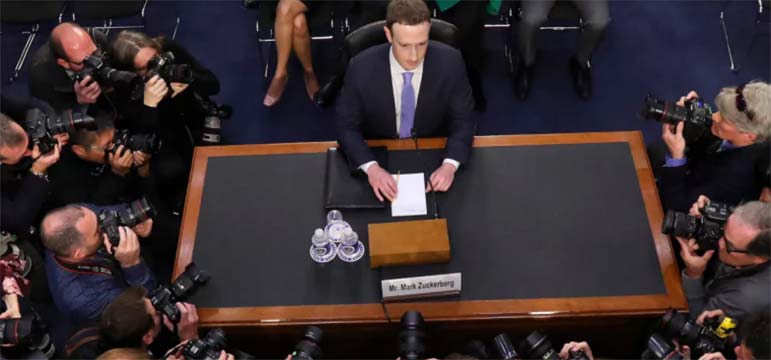
On Tuesday, Facebook CEO Mark Zuckerberg appeared before two Senate committees to testify about the company's much-ballyhooed problems with maintaining user privacy. Zuckerberg acquitted himself well — or at least as well as he had to, given the fact that most of those questioning him were septuagenarians whose last computers were abacuses. But Zuckerberg did screw up in two separate areas.
First, he acknowledged the problem of political bias at Facebook, explaining that Silicon Valley "is an extremely left-leaning place...I think it is a fair concern that people would at least wonder." Second, under pressure from Senator John Cornyn, R-Texas, Zuckerberg acknowledged that Facebook is "responsible for the content" posted on the platform.
In making both those statements, Zuckerberg may have put his company in a world of hurt legally. Platforms are generally not responsible for the material placed on them — for example, AT&T is not responsible for the content of calls made using AT&T phone lines. But publishers are responsible for such material — if a newspaper publishes an op-ed containing slanderous material, the newspaper could be held legally responsible.
So, how many slanderous Facebook posts are published per minute on the social media network? How many un-copyrighted photos make their way to Facebook? If courts decide to treat Facebook as a publisher rather than as a platform, they're suddenly subject to tens of millions of dollars in legal liability, at minimum.
But it's Zuckerberg's recognition of political bias, combined with his muscular take on Facebook's role, that demonstrates just how social media have re-imposed informational gatekeepers in the public square. For decades, the vast majority of Americans received their information from three television networks: CBS, NBC, ABC. They received their print information from The New York Times, The Washington Post, and their local newspaper. Then the internet arrived, and destroyed that oligopoly: Suddenly, information could be garnered from nearly anywhere.
Over time, however, people began engaging with news through social media sites like Facebook. No longer did they bookmark five different news pages and then browse the content; now, they merely followed a particular news outlet, and waited for headlines to pop up in their feed. As Facebook grew, media outlets were encouraged by the market — and by Facebook policy — to advertise their presence on the network, thereby reaching consumers. Facebook, which presented itself as a platform for other publishers, gave a boost to a bevy of new media outlets.
Then Facebook began to censor material. Instead of continuing to act as a neutral arbiter of information, Facebook began to impose its own preferences, downgrading particular stories and upgrading others, suspending certain accounts while maintaining others. Now, with Democrats suggesting that Facebook's failure to crack down on Russian bots was responsible for Hillary Clinton's loss, Facebook's leadership seeks to restrict opposing viewpoints, largely conservative, all the more.
The result: a reinstitution of a gatekeeping system in news.
Now, those who agree with Zuckerberg's politics — and the general politics of Silicon Valley — may celebrate the reinstitution of the gatekeepers. But consumers are being manipulated without being informed: They can follow conservative outlets and never see a single story from those outlets, while being supplied news from Facebook-approved media outlets. That means that Zuckerberg and his coterie control the flow of information.
And that's a problem. Americans will find other ways to follow their news over time. But the dishonesty of marketing your biased outlet as an unbiased platform has significant consequences for our politics.
First off, it shatters our confidence in social media generally. Second, it drives consumers to give equal credibility to fringey outlets downgraded by Facebook and normal conservative outlets similarly downgraded by Facebook. Third, it dishonestly restores the dominance of a media elite without informing consumers.
Zuckerberg ought to return to his original vision for his company: as a neutral platform designed to allow people to follow the people and outlets they want. His algorithmic choices ought to be transparent, so that consumers know what they're getting. Otherwise, Zuckerberg ought to be treated just like any other newspaper editor, and Facebook ought to be held to the same editorial standards.


 Contact The Editor
Contact The Editor
 Articles By This Author
Articles By This Author